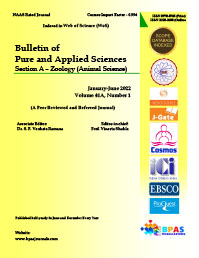Study of the Effect of Hypothyroidism and Thyrotoxicosis on the Proliferative Activity of the Red Bone Marrow in Experimental Animals with an Implanted Akatol Tumor
DOI:
https://doi.org/10.48165/Keywords:
Tumor strain of colon adenocarcinoma AKATO, Red Bone Marrow, Thyroid Hormones, Apoptosis, Hypothyroidism, Thyrotoxicosis, BALB /c mice with implanted AKATOL tumorAbstract
Analysis of the morphological structure of histological preparations of the thymus of experimental animals showed that experimental hypothyroidism leads to significant rearrangements both in the cellular composition and in the structure of the organ. The absolute area of the cortical zone, in comparison with the control group, significantly decreases, signs of hypertrophy of epithelial cells and an increase in the intensity of intracellular differentiation processes are revealed. There is little or no tissue proliferation. The proportion of lymphocytes in the cortical zone is 65.26±1.50%, the proportion of epithelial cells is 2.1±0.45%, which is significantly lower than those in the control group IV–81.45±1.22% and 4.2±0.63%, respectively. There are areas of rarefaction and degradation of the thymus tissue, which demonstrates the high rate of involutional processes. The thymus sharply decreased in size relative to the control and was represented by two small lobes and fragments, or was divided into separate segments, often of an irregular shape.
Downloads
References
Abduvaliev A.A., Gildieva M.S. & Saatov T.S. (2006). Thyroxine regulation of proliferation of estrogen- and progesterone-negative breast cancer cells. Russian Oncological Journal. 2, 15-18.
Abduvaliev A.A., Gildieva M.S. & Saatov T.S. (2005). Biological effects of thyroxine in experimental carcinogenesis. Problems of endocrinology. Мoskow. 1, 46-49.
Agol V.I. (1996). Genetically programmed cell death. Soros Educational Journal. - Moscow. 6, 20-24.
Azimova B. Zh. (2008). Thyroxine regulation of apoptosis and proliferation of tumor cells in experimental carcinogenesis. - Dis. Cand. biol. sciences. Tashkent, 2008. 120 p.
Akramova G.S., Umerov O.I. & Saatov T.S. (2002). Membrane lipids in the implementation of the effect of thyroxine on glucose transport in skeletal muscles Uzbek Biological Journal. Tashkent. 2, 3-6.
Axel E.M. (2006). The state of cancer care to the population of Russia and the CIS countries in 2004. Bulletin of the Russian Oncological Center. N.N. Blokhin RAMS. - Moscow. 17(3), 11-44.
Appay V., Sauce D., & Prelog M. (2010). The role of the thymus in immunosenescence: lessons from the study of thymectomized individuals. Aging (Albany NY). 2(2), 78-81.
Bazarov B.M., Rajamuradov Z.T. (2020). The total amount of leukocytes in the blood of astrakhan sheep and changes in the immune system depending on the seasons and nutritional conditions.International Journal of Advanced Science and Technology. 29(9), 5327-5331.
Ismailov S.I. (2007). Elimination of iodine deficiency diseases in Uzbekistan. Problems of Biology and Medicine. Tashkent. 50(4), 3-8.
Ipatov A.V. (2003). Invalidity of ailments of the endocrine system: camp, tendencies and medical and social problems. Endocrinology. 2, 150-157.
Kelly T., Lieberman D.Z. (2009). (The use of triiodothyronine as an augmentation agent in treatment-resistant bipolar II and bipolar disorder NOS. J. Affect Disord. – ]116(3), 222-226.
Zlamy M., Prelog M. (2009). Thymectomy in early childhood: a model for premature T cell immunosenescence. Rejuvenation Res. 12(4), 249-258.
